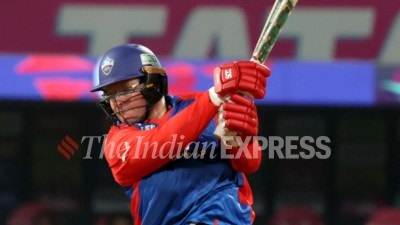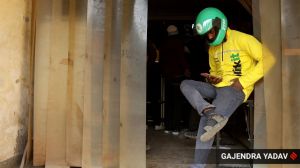Ending the parkati8217; problem
With the Congress at Pachmarhi having resiled from support to the Consti-tution 84th Amendment Bill as it is'' to passage with the ...

With the Congress at Pachmarhi having resiled from support to the Consti-tution 84th Amendment Bill 8220;as it is8221; to 8220;passage with the broad-based support of all political parties8221;, the Geeta Mukherjee Committee formula of one-third reservation of seats for women has been virtually given a burial. For the Mulayam-Laloo combine have made it crystal clear that they will accept reservations only if it includes a built-in quota for OBCs and minorities. And that opens up so many other vistas of controversy that the issue of women8217;s empowerment gets sidetracked into the exclusion of parkatis, the bobbed-hair brigade.
It is fascinating that those who are so seeking to divert attention from the issue of gender empowerment to caste empowerment are not seeking OBC reservations for men. They know that if they did, the number of OBC men in the Lok Sabha would sharply decline. Take for instance my home state of Tamil Nadu. Apart from P. Chidambaram, every Tamil Nadu MP is a backward or Dalit. Any quota for the backwards would merely increase the number of Aiyars and Chettiars representing the state. And the same is true for vast swathes of India, including the state of UP and Bihar where the two Yadavs have their fiefdoms.
That this should be so stands to reason. For the OBCs, along with the SCs, represent the bahujan samaj, the majority in society. Since democracy is about numbers, not merit8217;, howsoever defined, it is clear that if voters voted on caste affiliations, it is those who represent the bahujan samaj who will get elected. That voters frequently see beyond caste affiliations is what accounts for the presence in disproportionate numbers, if still in a minority, of upper caste MPs. But that is another and more complex matter. The straight answer to the logical question, that if there is to be reservations for OBC women, should there not be OBC reservations for men too, is 8220;No,8221; because that would merely lead to the relative disempowerment, compared to the present, of that section of society.
It is, of course, politically incorrect to point out that the argument for reservations for women OBCs seems insulting to OBC women because it can hardly be seriously held that, out of some 250 million OBC women in the country, 250 serious women candidates cannot be found to contest elections without reservations based on caste.
And as for the minorities, while it is certainly true that we have gravely failed in delivering anything like proportionate representation to the Muslims, the number of Christians and Sikhs in the House might decline if any attempt is made to link reservations for them to their strength in the population as a whole. Certainly, there would be a reduction in the number of Sikhs representing Punjab, and the same might be true of Christians representing Kerala and the Northeast. And as regards reservations for Muslims, no one can forget the harm done by separate electorates.
Reservations are, of course, as Gandhiji taught the Congress at Yera-vada in 1932, the alternative and answer to separate electorates. But even Babasaheb Ambedkar8217;s Constitution envisaged ST/ST reservations as a temporary ten-year expedient; social reality has since taught us that reservations have a life of their own. Hence, conceding reservations to the minorities would be to open the door to a drastic revision of our Constitution to remake it on the pattern of Lebanon, where elective and government positions were reserved for different communities. For about a quarter of a century, the model worked marvelously well, Lebanon becoming by far the most progressive state in West Asia. Then the divisions in society overwhelmed the system, and the breakdown of the system led to the breakdown of the state.
What we should be aiming at is not the reservation of 33 per cent of seats for women but ensuring their participation in the political system to the extent of their share of the population 50 per cent. To get half of all MPs and MLAs to be women, and elected on the same basis as the Constitution provides for all at present, an obvious alternative would be to make all existing constituencies, for both state assemblies and the Lok Sabha, double-member constituencies, with at least one of the two seats in each constituency reserved for women. Automatically, at least 50 per cent of the House would comprise women. The chances are that the proportion of OBC women so elected would approximate the number of OBC men so elected. Thus, the parkati problem would stand resolved, and the question of fair representation for minority women could be addressed along with the question of fair representation for minority men.
The main objection to this scheme, it seems to me, would be that it would lead to the number of Lok Sabha MPs going up from 542 to 1084. Considering, however, that the House of Commons has one hundred more members than the Lok Sabha, although India8217;s population is 20 times that of the United Kingdom, an increase in the number of MPs, especially when half of them will automatically be women, would not only increase the representativeness of Parliament but also dramatically increase accessibility to MPs and MLAs for OBC and minority women voters. In every single constituency, there would be a woman MP or MLA who can be directly approached by the three or four hundred million OBC and Muslim women who are now the most inhibited by social custom and cultural mores from directly approaching elected male representatives. Now they will have a woman to go to. Empowerment does not mean only more women in the House; it also means access to the corridors of power for every woman in the house.
And if, notwithstanding this argument, 1084 MPs is regarded as much too many I, for one, would be ready to see the Rajya Sabha and its counterpart upper chambers in the states abolished to make way for more elected women MPs and MLAs. For representation for women MPs and accessibility for women voters seems to me to be much more important than continuing an institution that, in practice over the last 50 years, has proved to be less a Council of the States than a dumping ground for unelectable 8220;elders8221;.
Top
- 01
- 02
- 03
- 04
- 05































